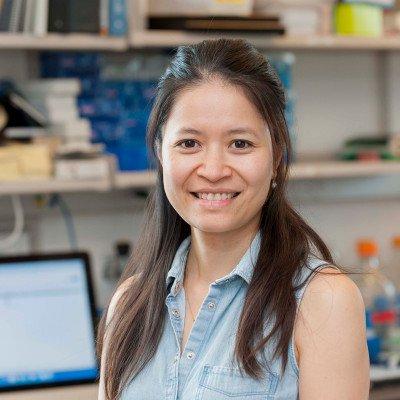
Dr Diu Nguyen
MSc, PhD
Lecturer
CRUK Career Development Fellow
Group Leader
diunguyenlab.com TwitterResearch Focus
The overarching goal of our laboratory is to understand the biology of normal haematopoietic and leukaemic stem cells in order to selectively kill cancer stem cells for better leukaemia treatment.
Key Publications
- BTG1 mutation yields supercompetitive B cells primed for malignant transformation. Science (2023) 379(6629):eabj7412 PMID: 36656933.
- RNA binding protein SYNCRIP maintains proteostasis and self-renewal of hematopoietic stem and progenitor cells. Nat Commun. (2023) 14(1):2290. PMID: 37085479
- Transcriptional control of CBX5 by the RNA binding proteins RBMX and RBMXL1 maintains chromatin state in myeloid leukemia. Nat Cancer (2021) 2:741-757. PMID: 34458856
- N 6-Methyladenosine on mRNA facilitates a phase-separated nuclear body that suppresses myeloid leukemic differentiation. Cancer Cell (2021) 39(7):958-972.e8. PMID: 34048709
- HyperTRIBE uncovers increased MUSASHI-2 RNA binding activity and differential regulation in leukemic stem cells. Nat Commun (2020) 11(1):2026. PMID: 32332729
Major Funding
- 2023- 2027 - Barts Charity Research project grant, £231,362
- 2022 - Cancer Research UK City of London Development Fund, Generating a model to study translation landscape during cancer development and treatment, £25,000
- 2022-2028 - Cancer Research UK Career Development Fellowship, £1,258,197
- 2021-2023- American Society of Hematology Scholar Award, “Uncovering differential translational program in AML”, $100,000
Other Activities
- Part of the Barts RNA Cancer Hub
Research
Stem cells are key to our normal development. When a stem cell divides into two, it creates one progenitor and one renews itself. The progenitor continues differentiating into mature specialised cells while the stem cell repeats the division cycle of making progenitors and reproducing themselves. Stem cells survive much longer than ordinary cells, increasing the chance of accumulating mutations. It might take only a few mutations for one cell to lose control over its self-renewal, divide uncontrollably and become the source of cancer.
Cancer stem cells (CSCs) are a small population of rare cells that can self-renew and differentiate into cancerous cells that proliferate uncontrollably, supplying the tumor mass. Conventional therapies, such as chemo- or radiotherapy, often target proliferating cells, leaving CSCs untouched. Therefore, CSCs are the underlying source of drug resistance and disease relapse.
The overarching goal of our laboratory is to understand the biology of normal haematopoietic (HSCs) and leukaemic stem cells (LSCs) in order to selectively kill cancer stem cells for better leukaemia treatment.
Gene expression defines the fate and function of each cell. Our recent work and others have demonstrated that post-transcriptional regulation of gene expression by RNA-binding proteins (RBPs) plays a critical role in cancer including leukaemia (Vu,…, Nguyen et al. 2017; Nguyen et al. Nat. Comms 2020; Cheng,…, Nguyen et al. Cancer Cells 2021; Prieto and Nguyen et al. Nat Cancer 2021). Importantly, the identification of dysregulated RBPs in leukaemia has led to the rapid development of therapeutic strategies to specifically target several RBPs. Despite their importance and therapeutic potential, only a small fraction of RNA regulators (>1,700 known RBPs) has been investigated in leukaemia.
Our lab aims to expand understanding of how dysregulated post-transcriptional processes contribute to the initiation and progression of various types of leukaemia. We particularly focus on acute myeloid leukaemia (AML) which has been one of the most aggressive and fatal types of blood cancer. To achieve this aim, we will:
- Determine the role of a subset of aberrantly expressed RBPs in LSC survival and whether they contribute to leukaemia pathogenesis.
- Investigate how these RBPs control normal HSCs behaviours.
- Elucidate the molecular basis for RBP functions in blood cancer.
We will address this question using state-of-the-art tools including unbiased omic approaches to map RBPs’ binding sites and activities including HyperTRIBE (Nguyen et al., Nat Comms, 2020), Ribo-STAMP (Brannan et al. Nat Methods 2021) and high-end Mass spectrometry, combined with molecular biology techniques, on animal models, human primary samples and xenografts.
The ultimate goal of our research is to determine the potential targetable RBPs and their molecular mechanisms of action. Once validated, these targets can be used for designing innovative drugs that selectively eradicate LSCs in AML, while sparing normal HSCs.
Other Activities
- Part of the Barts RNA Cancer Hub
Major Funding
- 2023- 2027 - Barts Charity Research project grant, £231,362
- 2022 - Cancer Research UK City of London Development Fund, Generating a model to study translation landscape during cancer development and treatment, £25,000
- 2022-2028- Cancer Research UK Career Development Fellowship, £1,258,197
- 2021-2023- American Society of Hematology Scholar Award, “Uncovering differential translational program in AML”, $100,000
Recent Publications
RNA binding protein SYNCRIP maintains proteostasis and self-renewal of hematopoietic stem and progenitor cells Herrejon Chavez F, Luo H, Cifani P et al. Nature Communications (2023) 14(7)
BTG1 mutation yields supercompetitive B cells primed for malignant transformation Mlynarczyk C, Teater M, Pae J et al. Science (2023) 379(7)
For additional publications, please click hereTeam
Postdoctoral Researchers Research Technician- Kim-Phuong To
- Khadidja Habel
- Wisdom Igiogbe, Wellcome Biomedical Vacation Scholarship student
